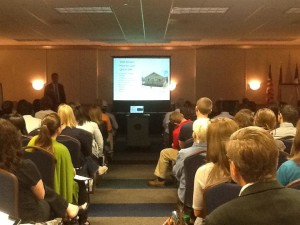We have much more to do and your continued support is needed now more than ever.
Universities as Models for Sustainability: Georgia Campus Sustainability Network’s Annual Conference
On Friday, September 14, 2012, 108 members of Georgia higher education institutions (faculty, staff, administrators, and students), as well as interested organizations, came together for the “Universities as Models for Sustainability: Georgia Campus Sustainability Network’s Annual Conference.” The conference was held at Georgia State University in the heart of downtown Atlanta.

The Conference was geared towards kicking off GCSN’s new year and new momentum. The session topics included energy usage amongst campus facilities, curriculum, funding and green fees, and student engagement. In each of these sessions, presentations were made by participants with significant success and experience in these areas. They were able to highlight how they went about executing their projects and how others could do the same. Additionally, there was a presentation from executive board members of the student network, Georgia Youth for Environmental Solutions (GA YES!)

Everyone left the conference with new ideas and contacts on how to drive their sustainable agenda on campus such as GA Yes’s invite to students to be part of their action teams promoting sustainable change across GA’s public institutions and resources to do internal campus energy assessments. The steering committee was especially pleased with the great turn-out of students that attended. That has been a struggle of GCSN; to engage students to the point they are not only inspired to change the carbon footprint of their campus, but also impact public campaigns regarding environmental matters state and nationwide.





















